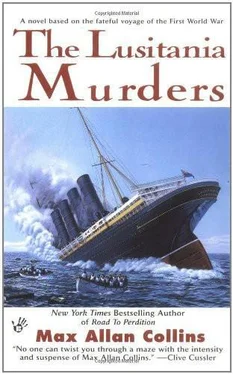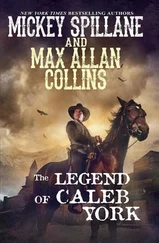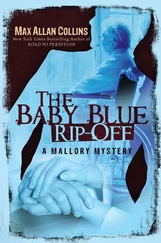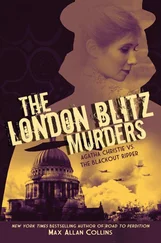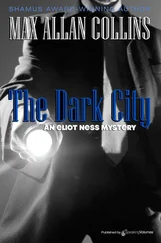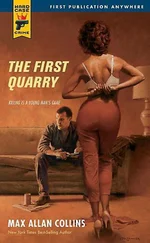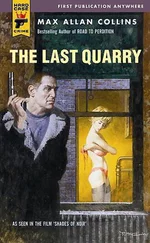Max Collins - The Lusitania Murders
Здесь есть возможность читать онлайн «Max Collins - The Lusitania Murders» весь текст электронной книги совершенно бесплатно (целиком полную версию без сокращений). В некоторых случаях можно слушать аудио, скачать через торрент в формате fb2 и присутствует краткое содержание. Жанр: Криминальный детектив, на английском языке. Описание произведения, (предисловие) а так же отзывы посетителей доступны на портале библиотеки ЛибКат.
- Название:The Lusitania Murders
- Автор:
- Жанр:
- Год:неизвестен
- ISBN:нет данных
- Рейтинг книги:3 / 5. Голосов: 1
-
Избранное:Добавить в избранное
- Отзывы:
-
Ваша оценка:
- 60
- 1
- 2
- 3
- 4
- 5
The Lusitania Murders: краткое содержание, описание и аннотация
Предлагаем к чтению аннотацию, описание, краткое содержание или предисловие (зависит от того, что написал сам автор книги «The Lusitania Murders»). Если вы не нашли необходимую информацию о книге — напишите в комментариях, мы постараемся отыскать её.
The Lusitania Murders — читать онлайн бесплатно полную книгу (весь текст) целиком
Ниже представлен текст книги, разбитый по страницам. Система сохранения места последней прочитанной страницы, позволяет с удобством читать онлайн бесплатно книгу «The Lusitania Murders», без необходимости каждый раз заново искать на чём Вы остановились. Поставьте закладку, и сможете в любой момент перейти на страницу, на которой закончили чтение.
Интервал:
Закладка:
Soon we were moving through the deserted, cavernous first-class dining saloon, three abreast. Miss Vance, perhaps sensing a growing aggravation in Anderson, said nothing. I, of course, threw caution to the wind.
“What do you make of the list?” I asked. “Why room numbers?”
Anderson’s expression was blank. “I would hesitate to speculate. . Miss Vance, have you a thought?”
Seizing the opening, she said, “It could be a list of targets. . assassination targets.”
That, frankly, had not occurred to me, and it stopped me momentarily in my tracks; but I quickly caught up with them-Anderson hadn’t missed a beat, this dire possibility apparently having dawned on him, as well.
“It would certainly be demoralizing to the British government,” Anderson said, “should such important parties be lost while under our protection.”
“You can’t be serious,” I said. “The Germans don’t want the United States in your damned war! Why, killing the likes of Vanderbilt and Hubbard and the rest, that would incite Americans to the point of hysteria.”
We were in the Grand Entrance area now, that bulwark of wicker and ferns, the elevators and staircase opposite us.
Anderson had flinched at the phrase “damned war,” but his response did not indicate any offense had been taken. “Politics is Greek to me,” he said. “Still, I doubt your country would go to war over such killings; but the embarrassment to Great Britain, I should say, would be most devastating.”
On the elevator, Miss Vance said to Anderson, who stood between us, “Assassination isn’t the only purpose that list might hold.”
Anderson looked sideways at her, brow knit. “Can you tell me another?”
“These are rich people-don’t forget, I’m here in part to guard Madame DePage’s charity chest, which is itself a small fortune. Perhaps that list is meant to direct these stowaways. . posing as stewards. . to those cabins-for plunder.”
The elevator deposited us at the Grand Entrance of the Boat Deck, where more wicker and ferns awaited. Anderson paused there, his patience obviously wearing thin.
“Miss Vance,” he said, “these are spies-German spies.”
Her smile was cheerfully professional. “And may I remind you that the darkroom found nothing at all on their camera plates?”
This was the first I’d heard of that; but I didn’t see it as significant: We’d merely captured the espionage agents too early for them to indulge in their information gathering.
Anderson said something of a similar nature to Miss Vance, who replied, “Why do you assume theft and sabotage are mutually exclusive concerns?”
The staff captain’s eyes tightened and his head titled to one side-this was an interesting question.
She continued: “Why not commit espionage and/or sabotage, with a side dish of thievery. . If they were planning to wait until near the end of the voyage, off Ireland, our three ‘tourists’ may well have been picked up by members of the IRA, who are in collusion with Germany, after all.”
Miss Vance never ceased to amaze me. I said, “You mean they could be funding IRA efforts to aid the German cause?”
“They could. Or they could be saboteurs taking advantage of their proximity to so much wealth, to do their country’s foul bidding even while feathering their own nests.”
I nodded. “Perhaps it had been offered as an incentive, in undertaking a perilous task?”
“Perhaps.”
Anderson seemed weary. He was really not up to this level of deliberative assessment, and I felt anything further Miss Vance offered would fall on deaf ears. What the staff captain said next confirmed my suspicion.
“With all due respect,” Anderson said to her, “I must request that you refrain from sharing with the captain any of these far-fetched theories.”
“I thought he’d requested my presence,” she said, “for me to make a full report.”
Anderson twitched a humorless smile and shrugged. “Use your own judgment, then.”
The captain’s suite of rooms took up the forward end of the Boat Deck, adjacent to the raised officer’s house on the navigating bridge. Anderson knocked on the middle of three unlabelled doors and a deep voice from within bellowed, “Come!”
We entered.
This was a day room-even if it was three in the morning-with white walls relieved by oak wainscotting and the occasional framed nautical print and a ship’s wheel clock; the furniture was Colonial and the effect spartan. A round maple table with four chairs was central, and on the table was a tray with tea service.
The old boy-though in his late fifties, he seemed nearer seventy-was smoking a pipe and pacing; he was wrapped up in a dark blue dressing gown, which somehow conveyed a military bearing, an effect undercut by his white pajama trousers and brown leather slippers. His thinning white hair was mussed from sleep-he had not bothered to brush it, apparently-and his jutting jaw, flat nose and slitted eyes combined to convey distinct grumpiness.
“Thank you for coming,” he said to us, his tone at odds with his words. There were no introductions, no ceremonial handshakes. He simply gestured to chairs at the round table, and offered everyone tea-“Coffee would defeat sleep,” he said, “and we do hope to have some yet, tonight, don’t we?”
No one pointed out to him that night was long since gone; but everyone accepted his generous offer and Miss Vance volunteered to do the serving, which Captain Turner took her up on, with a gruff, “Thanks.”
Turner’s big blunt-fingered hands lay on the table like fists waiting to happen, the pipe in one of them; the smoke smelled no worse than burning refuse. His grizzled countenance seemed to accuse, even as his words claimed otherwise: “I want you people to know I appreciate your efforts.”
“Thank you, sir,” Anderson said.
Miss Vance and I thanked him, as well, and sipped our tea.
“These are dangerous times,” the captain said, “and I don’t take them lightly.”
Had anyone suggested he had?
“I have a boy serving in France,” he said. “Artillery officer. And my other boy is in the Merchant Marine. . also an officer.”
There was an implied “of course.”
“Seems to me I’ve spent my life racing Cunard ships against these. . Germans,” he was saying, pausing for a few puffs of his pipe, as if stoking his personal boiler. “Their Deutschland. . Kronpriz Wilhelm, Kaiser Wilhelm II, even this new one, Kronprizessin Cecile . . hah! My girl Lusitania has shown them all her stern.”
Miss Vance and I smiled politely; Anderson, too.
“Now here we are racing their goddamned U-boats,” he growled, shaking his head. To Miss Vance he said, “Pardon a sailor’s salt, ma’am.”
“Don’t think of me as a woman,” Miss Vance said, making an impossible suggestion. “I’m a Pinkerton agent, Captain-and your ship’s detective.”
The weathered face smiled, but the cold eyes indicated his true opinion of Cunard having hired a female detective.
I risked a question. “How much danger are we in from U-boats, Captain?”
“None.” He puffed the pipe. “Even at our reduced speed, we’ll have no trouble outrunning them.”
“Reduced speed?”
One shoulder shrugged, and contempt curled his upper lip, a bit. “The powers that be have ordered me to get by on three of my four boilers-to save coal, and to suit our reduced crew. That takes our top speed down from twenty-six knots to twenty-one. . cruising speed from twenty-four to eighteen.”
“Still, no steamer cruising at even that speed has been torpedoed yet,” Anderson said, with an unconvincing offhandedness, shifting in his chair.
“That’s reassuring,” I said, but it would been more so without the “yet.”
Читать дальшеИнтервал:
Закладка:
Похожие книги на «The Lusitania Murders»
Представляем Вашему вниманию похожие книги на «The Lusitania Murders» списком для выбора. Мы отобрали схожую по названию и смыслу литературу в надежде предоставить читателям больше вариантов отыскать новые, интересные, ещё непрочитанные произведения.
Обсуждение, отзывы о книге «The Lusitania Murders» и просто собственные мнения читателей. Оставьте ваши комментарии, напишите, что Вы думаете о произведении, его смысле или главных героях. Укажите что конкретно понравилось, а что нет, и почему Вы так считаете.
